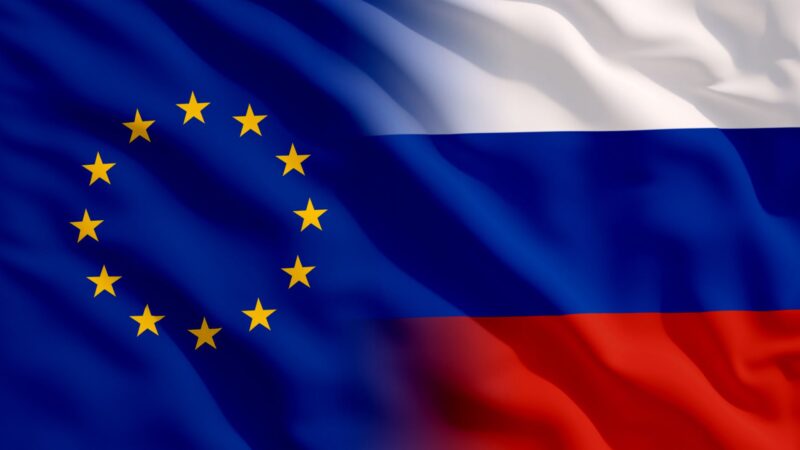Global Issues
The Global Impact Of The European Union Embargo On Russian Oil And The Veto Rights Of Member State -By Oyetola Muyiwa Atoyebi & Emmanuel Sogo
While the proposed sanction to boycott Russian oil by member states is laudable, it is sacrosanct to address some concerns; the European Union should focus more on the less usage of crude oil which deals with renewable energy, rather than look for alternative oil supplies. This is so, as member states have already begun the search for alternative oil supplies.

Over two months into Russia’s severe conflict with Ukraine, the European Union on Wednesday 4th April, 2022, declared plans to ban Russian oil. The essence of the sanction is to place economic hardship on the Russian economy as a result of its invasion of Ukraine, and ultimately put an end to the war.
INTRODUCTION
Over two months into Russia’s severe conflict with Ukraine, the European Union on Wednesday 4th April, 2022, declared plans to ban Russian oil, its greatest financial penance yet to incur torment for the Russian economy.
The action divulged by the leader of the European Commission, Ursula von der Leyen, is to boycott Russian oil imports to the European Union in the coming months, and refined oil products before the end of the year. The ban, contained in the 6th round of E.U. sanctions, is expected to gain the last endorsement from member states within a short time.
This scholarly discourse, therefore, seeks to shed light on the implications of the European Union embargo on Russian oil vis a viz the rights of member states to veto the proposal of the European Union.
WHAT THE EMBARGO ENTAILS
The EU’s ban on Russian oil means that States that are part of the European Union will no longer import Russian oil if the ban pulls through. The essence of the sanction is to place economic hardship on the Russian economy as a result of its invasion of Ukraine, and ultimately put an end to the war. It should be noted that Russia supplies 40% of the oil used by member states[1], so this means that states that rely heavily on Russian oil, will have to look for alternative sources as quickly as possible.
It is believed that Russia makes huge profits from oil supplies to Europe and in turn uses the funds to finance its war against Ukraine.[2]Research has shownthat Russia makes about 600 million euros in income from its oil exports to European nations[3]. If the ban sees the light of the day, Russia will face huge economic losses, and on the other hand European nations that place heavy reliance on Russian oil exports, will face severe hardship as it will not be easy to find alternative routes to salvage the impeding hike in oil prices.
THE RIGHTS OF MEMBER STATES
The European Union is a political and economic organization that is primarily made up of 27 member states, that are geographically situated in the heart of Europe. Member states have concurred by agreements to share their own supremacy through the organizations of the European Union in some way, however, not all parts of government. States are expected to concur consistently in the Council for the organization to embrace policy arrangements; while other decisions are made by voting with recourse to aggregate choices.[4]
What this means for the proposed Russian oil embargo in Europe is that every single member of the European Union must consent before the sanction can take full effect. Already, member states like Hungary and Slovakia have kicked against the proposed sanction as a result of their dependence on Russian oil to properly run their energy sector.
The European Union as at May 16th2022, almost two months since its proposed ban on Russian oil, have failed to bring all member states on board to consent to an oil ban against Russia, as a component of the 6th sanction over the conflict in Ukraine. [5]
A critical antagonist of the oil embargo is Hungary as it is requesting an excessive cost for greenlighting the bundle. During a recent meeting of foreign ministers of member states that were held in Brussels, the envoy from Ukraine, Dmytro Kuleba was quoted to have said the following words;
“It’s clear who’s holding up the issue, but time is running out because every day, Russia keeps making money and investing this money into the war.”
The Lithuanian Foreign Minister Gabrielius Landsbergis also aired his dissatisfaction as thus;
“Now, unfortunately, we are — the whole union is being held hostage by one-member state which cannot help us find a consensus.”
If there is any similarity in the above quotes, it is the fact that all 27 member states must reach a consensus before the proposed ban will be enforced in full effect. For now, all the EU can do is hope that Hungary comes to terms with the proposed embargo on Russian oil.
THE ECONOMIC IMPLICATIONS OF THE OIL EMBARGO
European nations have already raised inflation concerns over the EU’s proposition to part with Russian oil imports. Although, the President of the EU has promised that the proposed embargo will be implemented in a manner that will not occasion economic hardship on any states, economic experts still fear that it is not enough guarantee.
The reality is that if the embargo pushes through, the world will be left with less oil supply which will consequently lead to inflation in oil prices.[6] The German Industry Trade Group BDI said the following words;
“Given the oil embargo, energy prices will probably continue to rise.”
Germany’s Economic Minister also said;
“It’s inconceivable that sanctions won’t have consequences for our own economy and for prices in our countries,” he said. “We as Europeans are prepared to bear [the economic strain] in order to help Ukraine. But there’s no way this won’t come at a cost to us.”
It should be noted that Russia is the world’s third-largest oil producer after the US and Saudi Arabia, exporting over five million barrels of crude oil per day[7]. Whichever way we look at it, the oil embargo will affect the vast majority of European citizens as inflation in oil prices cannot be forestalled timeously.[8]
Furthermore, the oil embargo will deeply affect the Russian economy as a huge part of its revenue is dependent on oil export to Europe.
TACKLING THE ENERGY CRISIS
As part of the measures to part with Russian oil, the European Commission has reported a 210 billion euros ($220bn) planto end its reliance on Russian petroleum derivatives in a range of five years, and accelerate its progress to environmentally friendly energy. The EU anticipates that they should require 210 billion euros in additional ventures by 2027 and 300 billion euros ($314bn) by 2030,all in a bid to meet the 2030 environmentally friendly energy target.The ventures incorporate 86 billion euros ($90bn) for sustainable power and 27 billion ($28bn) for hydrogen foundation, 29 billion euros ($30bn) for power lattices, and 56 billion euros ($59bn) for energy investment funds and intensity siphons. This will aid the EU to achieve its new target of 45 per cent renewable energy sources by 2030, with its former target of 40 per cent. It will also help in replacing the energy consumption by 13 per cent by 2030, in contrast with its current 9 per cent proposal.[9]
Notwithstanding the wonderful plans of the EU in ditching Russian oil, the question still remains that member states need to find temporary solutions to cushion the effect of the embargo if it finally pushes through. As it stands, the only way forward according to analysts, is to look for alternative supplies in order to bridge the gap that the embargo would create.
CONCLUSION
While the proposed sanction to boycott Russian oil by member states is laudable, it is sacrosanct to address some concerns; the European Union should focus more on the less usage of crude oil which deals with renewable energy, rather than look for alternative oil supplies. This is so, as member states have already begun the search for alternative oil supplies.
On the issue of getting all parties to approve the proposed ban, it should consider the fears of Hungary and attempt to satisfy her demands. This will foster the arrangements and swiftly enforce the sanction as time is of the essence.
AUTHOR: Oyetola Muyiwa Atoyebi, SAN.
Mr. Oyetola Muyiwa Atoyebi, SAN is the Managing Partner of O. M. Atoyebi, S.A.N & Partners (OMAPLEX Law Firm) where he also doubles as the Team Lead of the Firm’s Emerging Areas of Law Practice.
MrAtoyebi’s vast knowledge and expertise in public international law and cross-border transactions has enabled him advise and represent a vast clientele in a variety of high-level transactions.He holds the honour of being the youngest lawyer in Nigeria’s history to be conferred with the rank of a Senior Advocate of Nigeria.
He can be reached at atoyebi@omaplex.com.ng
COUNTRIBUTOR: Emmanuel Sogo.
Emmanuel is a member of the Dispute Resolution Group at OMAPLEX Law Firm. He also holds commendable legal expertise in Energy Law
He can be reached at emmanuel.sogo@omaplex.com.ng.
[1] Kira Taylor; Oliver Noyan, ’Stop Financing Putin’s war with energy imports, Ukrainian NGO pleads’ <https://www.euractiv.com/section/energy/news/stop-financing-putins-war-with-energy-imports-ukrainian-ngo-pleads/>(2022) Accessed 22 May 2022
[2]Ibid
[3] Dave Keating, ‘What will an EU embargo on Russian oil mean?’ <https://www.energymonitor.ai/policy/international-treaties/what-will-an-eu-embargo-on-russian-oil-mean> Accessed May 22, 2022.
[4] Wikipedia, ‘Member State of the European Union’ <https://en.m.wikipedia.org/wiki/Member_state_of_the_European_Union> Accessed May 22, 2022.
[5] Lisa Bryant, ‘EU Fails to Clinch Russian Oil Embargo’ <https://www.voanews.com/amp/6576428.html> Last Accessed May 22, 2022.
[6] Alexander Weber, ‘Europe’s Russia oil embargo risks flaring already hot inflation’ <https://www.aljazeera.com/amp/economy/2022/5/4/europesrussia-oil-embargo-risks-flaring-already-hot-inflation>Accessed May 22, 2022.
[7] Dave Keating, ‘What will an EU embargo on Russian oil mean?’ <https://www.energymonitor.ai/policy/international-treaties/what-will-an-eu-embargo-on-russian-oil-mean> Accessed May 22, 2022.
[8]Ibid
[9]Ludovic Marin, ‘EU unveils $220bn plan to ditch Russian energy’<https://www.aljazeera.com/amp/news/2022/5/18/eu-rushes-out-210-billion-euro-investment-to-ditch-russian-energy>Accessed May 22, 2022.
















